catch-22美国文学选读
The Book Report catch22 《第二十二条军规》读书报告
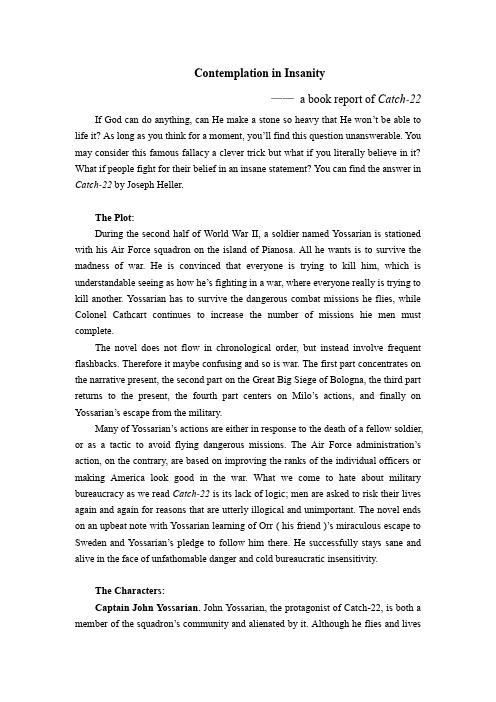
Contemplation in Insanity——a book report of Catch-22 If God can do anything, can He make a stone so heavy that He won’t be able to life it? As long as you think for a moment, you’ll find this question unanswerable. You may consider this famous fallacy a clever trick but what if you literally believe in it? What if people fight for their belief in an insane statement? You can find the answer in Catch-22 by Joseph Heller.The Plot:During the second half of World War II, a soldier named Yossarian is stationed with his Air Force squadron on the island of Pianosa. All he wants is to survive the madness of war. He is convinced that everyone is trying to kill him, which is understandable seeing as how he’s fighting in a war, where everyone really is trying to kill another. Yossarian has to survive the dangerous combat missions he flies, while Colonel Cathcart continues to increase the number of missions hie men must complete.The novel does not flow in chronological order, but instead involve frequent flashbacks. Therefore it maybe confusing and so is war. The first part concentrates on the narrative present, the second part on the Great Big Siege of Bologna, the third part returns to the present, the fourth part centers on Milo’s actions, and finally on Yossarian’s escape from the military.Many of Yossarian’s actions are either in response to the death of a fellow soldier, or as a tactic to avoid flying dangerous missions. The Air Force administration’s action, on the contrary, are based on improving the ranks of the individual officers or making America look good in the war. What we come to hate about military bureaucracy as we read Catch-22 is its lack of logic; men are asked to risk their lives again and again for reasons that are utterly illogical and unimportant. The novel ends on an upbeat note with Yossarian learning of Orr ( his friend )’s miraculous escape to Sweden and Yossarian’s pledge to follow him there. He successfully stays sane and alive in the face of unfathomable danger and cold bureaucratic insensitivity.The Characters:Captain John Yossarian. John Yossarian, the protagonist of Catch-22, is both a member of the squadron’s community and alienated by it. Although he flies and liveswith the men, he is marked as an outsider by the fact that many of the men think he is insane. But Yossarian’s characteristics are not those of a typical hero. He does not risk his life to save others; in fact, his primary goal throughout the novel is to avoid risking his life whenever possible. Maybe it is because that the system of values around Yossarian is so skewed that this approach seems to be the only truly moral stance he can take, if only because it is so logical. In a world where life itself is so undervalued and so casually lost, it is possible to redefine heroism as simple self-preservation. In the end, when offered a choice between his own safety and the safety of the entire squadron, Yossarian is unable to choose himself over others. This concern for others complicates the simple logic of self-preservation, and creates its own Catch-22: life is not worth living without a moral concern for the well-being of others, but a moral concern for the well-being of others endangers one’s life.Milo Minderbinder.Representing an extreme version of capitalist free enterprise that has spiraled out of control, Milo seems simultaneously brilliant and insane. What starts out as a business in black-market eggs turns into a worldwide enterprise in which, he claims, “everyone has a share.” He lies, cheats and steals his way through the war. The Germans pay him to bomb his own base and the Americans pay him to bomb Germans. He uses military planes to fly his goods from place to place, and lives in palaces. Milo tells the men in his squadron that they all have a share of his profits, but he bombs his own squadron as part of a deal he has made with the Germans. His willingness to allow his own camp to be bombed shows his complete disregard for the sides drawn by the war, and the men’ s acceptance of payment for being bombed shows that Milo is not alone in placing a high value on making money.The Themes and Ideas:Catch-22.There’s only one catch to Yossarian’s plan to save himself, and that’s Catch-22. This passage from Chapter 5 marks the novel’s first mention of the paradoxical law called “Catch-22.”There was only one catch and that was Catch-22, which specified that a concern for one’s own safety in the face of dangers that were real and immediate was the process of a rational mind. Orr was crazy and could be grounded. All he had to do was ask; and as soon as he did, he would no longer be crazy and would have to fly more missions. Orr would be crazy to fly more missions and sane if he didn’t, but if he wassane he would have to fly them. If he flew them he was crazy and didn’t have to; but if he didn't want to he was sane and had to. Yossarian was moved very deeply by the absolute simplicity of this clause of Catch-22 and let out a respectful whistle.“That’s some catch, that Catch-22,” he observed.“It’s the best there is,” Doc Daneeka agreed.The more Yossarian learns about Catch-22, though, the bigger it grows, each new clause as infuriating and paradoxical as the last. Catch-22, we learn, is the Bible of bureaucracy — every pointless and petty regulation made by someone who has never seen a battlefield to make themselves look good with no sleep lost for the people like Yossarian who get killed in the process.There’s no reasoning or arguing with Catch-22. It’s not personal. It’s just the rules, and if the rules say that Yossarian has to die, then that’s what Yossarian has to do.Over the course of the novel, Catch-22 is described in a number of different ways that can be applied to a number of different aspects of wartime life; here, however, Catch-22 affects Yossarian most specifically. Catch-22 is alarmingly persuasive; even Yossarian accepts what seems to be its logical infallibility. But Catch-22 is an abstract thing; we find out later that Yossarian believes that Catch-22 does not really exist. It is a trap made up of words, and words are faulty things, often misrepresenting reality. What is so upsetting about the way Catch-22 is applied throughout the novel is that real men are sent into real peril based on a few unreal and unreliable words. The the pointlessness of the fact makes Yossarian crazy.Personality in the insane world.Unlike other anti-romantic war novels, Catch-22relies heavily on humor to convey the insanity of war, presenting the horrible meaninglessness of armed conflict through a kind of desperate absurdity rather than through graphic depictions of suffering and violence. Catch-22also distinguishes itself from other anti-romantic war novels through its core values: the story of Yossarian, the protagonist, is ultimately not one of despair but one of hope. He believes that the positive urge to live and to be free can redeem the individual from the dehumanizing machinery of war. The novel is told as a series of loosely related, tangential stories in no particular chronological order. The narrative that emerges from this structural tangle upholds the value of the individual in the face of the impersonal, collective military mass; at every stage it mocks insincerity and hypocrisy, even when such values appear triumphant.Despite its World War II setting, Catch-22is often thought of as a signaturenovel of the 1960s and 1970s. It was during those decades that American youth truly began to question authority. Hippies, university protests, and the civil rights movement all marked the 1960s as a decade of revolution, and Heller’s novel fit in perfectly with the spirit of the times. In fact, Heller once said, “I wasn’t interested in the war in Catch-22. I was interested in the personal relationships in bureaucratic authority.” Whether Heller was using the war to comment on authority or using bureaucracy as a statement about the war, it is clear that Catch-22 is more than just a war novel. It is also a novel about the moral choices that every person must make when faced with a system of authority whose rules are both immoral and illogical. This reminds me the dark ten years of the Great Proletarian Cultural Revolution. Millions of people were persecuted and suffered a wide range of abuses and millions of people became insane illogical, which makes the perseverance of personal principles more valuable and remarkable.Reference:[1]约瑟夫·海勒.第二十二条军规[M].南京: 译林出版社.[2]常文革.黑色幽默的典范[N].长春师范学院学报,2005-9。
CATCH-22 陷阱(2016-5-10)

【Catch-22 】陷阱- 刘宁-最近的VOA有一篇关于银行质押买房的文章,文中遇到一个名词"Catch-22",词义解释为困境,颇感新鲜。
经查阅,方知“Catch-22”源自于美国的一部讽刺性的长篇小说,后拍成电影。
充满黑色幽默的故事,演绎了处于这种"Catch-22"陷阱的可怜的人们百般无奈。
很有意思,特剪出部分精华和体会与大家分享。
Catch-22 means A situation in which a desired outcome or solution is impossible to attain because of a set of inherently illogical rules or conditions。
该词用来形容“由于自相矛盾/不合逻辑的政策或规定导致人们处于无法摆脱的一个困境、或难以逾越的一个障碍或陷阱。
显然,它与Dilemma (困境)的含义是有区别的。
Dilemma : a situation in which a difficult choice has to be made between two or more alternatives(进退两难的困境)※故事梗概"Catch-22" 是美国作家约瑟夫·海勒讲述二战时期美国一个空军中队故事的长篇小说。
“Catch-22”是美国空军军规中的第22条,故,小说和电影中文皆译成“第22条军规”。
本书主人公是飞行中队的上尉轰炸手。
他满怀拯救正义的热忱投入战争,立下战功,被提升为上尉。
然而他在和周围凶险环境的冲突中,亲眼目睹了那种种虚妄、荒诞、疯狂、残酷的现象后,逐渐领悟到自己是受骗了。
他变严肃诚挚为玩世不恭,从热爱战争变为厌恶战争。
他不想升官发财,也不愿无谓牺牲,他只希望早点活着回家。
围绕着如何早点离开战争,作者演绎出两段颇具黑色幽默的故事,让读者看到Catch-22军规其实就是自相矛盾的悖论,根本无法实施,最后得出结论:Catch-22 就是一个让人们无法逾越的陷阱!悖论-1:自相矛盾的上级政策和许诺 = 空话、屁话空军司令部规定,完成25次战斗飞行的人有权申请回国,但须获得上司批准。
Catch-22
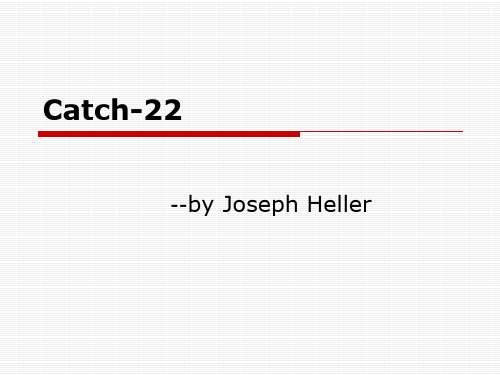
Brief Introduction of the Author
We Bombed in New Haven, 1968 《我们轰炸了纽黑文》 Something Happened, 1974 《出了毛病》 Good as Gold, 1979 《像高尔德那样好》 God Knows, 1984 《天晓得》
Writing Techniques-- Use of Black Humor Example:
Yossarian receives decoration naked. Yossarian is naked at the funeral of his follow pilot, Snowden.
Catch-22
--by Joseph Heller
Catch-22
Brief Introduction of the Author Appreciation of the Writing 1. A Summary of the Writing 2. The Theme of the Writing 3. Writing Techniques Employed
Brief Introduction of the Author
None; outdoes; representive work his reputation; maily; rested on Catch-22
Appreciation of the Novel
A Summary of the Writing The Theme of the Writing Writing Techniques Employed
A Summary of the Writing
seen; critics; best novel; World War II significance; reaches; beyond; war itself its purpose; satirize; American bureaucracy uncover (揭露); ugliness (丑恶) show (表现); bewilderment; man’s plight (处境)
美国文学选读名词解释之令狐文艳创作

1.Puritanism(清教主义): Puritanism is the practices and beliefs of the Puritans.1.令狐文艳2.) simply speaking , American Puritanism just refers to the spirit and ideal of puritans,who settled in the North American continent in the early part of the seventeenth century because of religious persecutions.3.)In content it means scrupulous ,moral rigor ,eapecially hostility to social pleasure and religion .4.)with time passing it became a dominant factor in American life , one of the most enduring shaping influences in American thought and literature .to some extentit is a state of mind , a part of the nationalcultural atmosphere that the American breathes ,rather than a set of tenets.5.)Actually it is a code of values , a philosophy of life and a point of view in American minds , also a two-facetedtradition of religious idealism and level -headed in common sense .5)Major topic:American Puritanism IntroductionThere were no written literature among the more than 500 different Indian languages and tribal cultures,American writing began with the work of English adventurers andcolonists in the New World chiefly for the benefit of readers in the mother country. Therefore the writing in this period was essentially two kinds:(1)practical matter-of-fact accounts of farming, hunting, travel, etc. designed to inform people “at home” what life was likein the new world, and, often, to inducetheir immigration;(2) highly theoretical, generallypolemical(好辩的), discussions of religious questions.2.The American Romanticism(浪漫主义)I. What is Romanticisma literary movement flourished as a cultural forcethe early period and the late period. associated with imagination and boundlessness,as an historical movement it arose in the18th and 19th centuries.The most clearly defined romantic literary movement in the U. S.A was Transcendentalism. Washington Irving and James Fenimore Cooper, and those of the late period contain Ralph Waldo Emerson, Henry David Thoreau, WaltWhitman, Nathaniel Hawthorne, Herman Melville, Edgar Allan Poe.II.Features of American romanticism(1) It was the expression of “a real new experience(全新体验)”.(2) American Puritanism was a cultural heritage. Many American romantic writings intended to edify(启发) more than they entertained.(3) American Romanticism is full of “newness(新奇)” .Ideals:Individualism; political equality Dream:America: a new Garden of Eden(4)American romanticism was both imitative and independent.3..transcendentalism、(超验主义)transcendentalism: It stressed the power of intuition, believing that people could learn things both from the outside world by means of the five senses and from the inner worldby intuition. It took nature as symbolic of spirit or God. All things in nature were symbols of the spiritual, of God’s presence. It emphasized the significance of the individual and believed that the individual was the most important element in societyand that the ideal kind of individual wasself-reliant and unselfish. Transcendentalists envisioned religion as an emotional communication between anindividual soul and the universal “Oversoul”.4.Naturalism: It views human beings as animals in the natural world responding to environmental forces and internal stresses and drives, over none of which they have control and none of which they fully understand. The literary naturalists have a major difference from the realists. Theylook at a different spot to find real life.5.Free verse: It is poetry that has an irregular rhythm and line length and that attempts to avoid any predetermined verse structure; instead, it uses the cadences of natural speech.6.International novel: IN brings together persons of various nationalities who represent certain characteristics of their own countries.7.the lost generation: reveals the huge destruction of the wars to the young generation. It describes the Americans who remained in Paris as a colony of “expatriates”. They were lost in disillusionment.8,American Dream: American dream means the belief that everyone can succeed as long as he/she works hard enough. It usually implies a successful and satisfying life. It usually framed in terms of American capitalism(资本主义), its associated purported meritocracy,(知识界精华)and the freedoms guaranteed by the U.S. Bill of Rights9.American Realism: In American literature, the Civil War brought the Romantic Period to an end. The Age of Realism came into existence. It came as a reaction against the lie of romanticism and sentimentalism. Realism turned from an emphasis on the strange toward a faithful rendering of the ordinary, a slice of life as it is really lived. It expresses the concern for commonplace and the low, and it offers an objective rather than an idealistic view of human nature and human experience .10. Black Humor:also called Black Comedy, writing that juxtaposes morbid or ghastly elements with comical ones. The term did not come into common use until the 1960s. Thenit was applied to the works of the novelistsNathanael West, Vladimir Nabokov, and Joseph Heller. The latter's Catch-22 (1961) is a notable example, in which Captain Yossarian battles the horrors of air warfare over the Mediterranean during World War II with hilarious irrationalities matching the stupidities of the military system. The term black comedy has been applied to playwrights in the Theatre of the Absurd.11.Local colorism: as a trend became dominant in American literature in the 1860s and early 1870s,it is defined by Hamlin Garland as having such quality of texture and background that it could not have been written in any other place or by anyone else than a native stories of local colorism have a quality of circumstantial(详细的) authenticity(确实性), as local colorists tried to immortalize(使不朽) the distinctivenatural, social and linguistic features. It is characteristic of vernacular(本国语) language and satirical(讽刺的) humor12.Code HeroGeneral Features:1.He has great physical potential and courage.2. The “ code heroes ” have strong willpower.3. Thirdly , another important feature of the “code heroes" is their loyalty.4. Fourthly , the" code heroes ”maintain great dignity in all situations.5. Fifthly , the “code heroes ” are endowed with certain specialized skills , such as fishing , bull fighting , and hunting , etc6, the “code heroes ”are always put in some touch-and go situations, what theheroes must always face up to is their own personal fear of death and the threat of destruction, and it is this obstacle, death, that they have to overcome.13.iceberg theory:The dignity of movement of the iceberg is due to only one-eighth of it being above water.2 American TranscendentalismAs a philosophical and literary movement, American Transcendentalism (also known as “ American Renaissance”) flourished in New England from the 1830s to the Civil War. It is the high tide of American romanticism and its doctrines found their greatest literary advocates in Emerson and Thoreau. Transcendentalists spoke for the cultural rejuvenation and against the materialism of American society.Transcendentalism 超验主义(+ H. D. Thoreau; Nathaniel Hawthorne; )The major features of Transcendentalism:① The Transcendentalists placed emphasis on spirit, or the Oversoul, as the most important thing in the universe. 思想超灵宇宙② The Transcendentalists stressed the importance of the individual. To them, the individual is the most important element of Society. 个体+社会③ The Transcendentalists offered a fresh perception of nature as symbolic of the Spirit or God. Nature was not purely matter. It was alive, filled with God’s overwhelming presence. 自然+上帝3 Stream of Consciousness 意识流or“interior monologue”,内心独白 is one of the modern literary techniques. It is thestyle of writing that attempts to imitate the natural flow of a character’s thoughts, feelings, reflections, memories, and mental images as the character experiences them. It was first used in 1922 by the Irish novelist James Joyce.。
Unit16-Catch-22
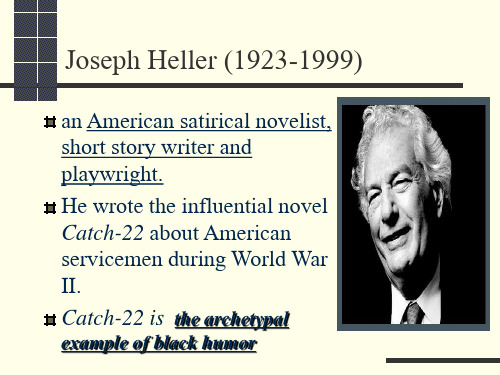
Anti-hero
• The anti-hero is also an important figure in modern drama, both in the theatre of the absurd and in the tragedies of Arthur Miller, notably Death of a Salesman (1949).
Joseph Heller (1923-1999)
an American satirical novelist, short story writer and playwright. He wrote the influential novel Catch-22 about American servicemen during World War II. Catch-22 is the archetypal
Black Humor
• In literature, drama, and film, grotesque or morbid humor used to express the absurdity, insensitivity, paradox, and cruelty of the modern world.
• Ordinary characters or situations are usually exaggerated far beyond the limits of normal satire or irony. Black humor uses devices often associated with tragedy and is sometimes equated with tragic farce.
Black Humor
catch 22
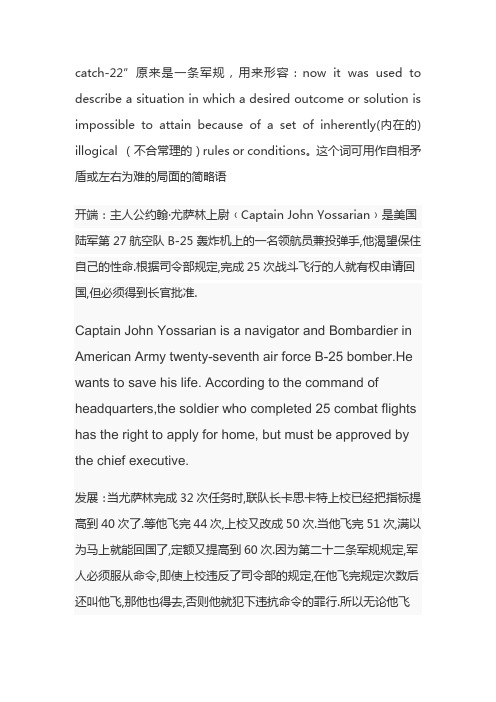
catch-22”原来是一条军规,用来形容:now it was used to describe a situation in which a desired outcome or solution is impossible to attain because of a set of inherently(内在的) illogical (不合常理的)rules or conditions。
这个词可用作自相矛盾或左右为难的局面的简略语开端:主人公约翰·尤萨林上尉﹙Captain John Yossarian﹚是美国陆军第27航空队B-25轰炸机上的一名领航员兼投弹手,他渴望保住自己的性命.根据司令部规定,完成25次战斗飞行的人就有权申请回国,但必须得到长官批准.Captain John Yossarian is a navigator and Bombardier in American Army twenty-seventh air force B-25 bomber.He wants to save his life. According to the command of headquarters,the soldier who completed 25 combat flights has the right to apply for home, but must be approved by the chief executive.发展:当尤萨林完成32次任务时,联队长卡思卡特上校已经把指标提高到40次了.等他飞完44次,上校又改成50次.当他飞完51次,满以为马上就能回国了,定额又提高到60次.因为第二十二条军规规定,军人必须服从命令,即使上校违反了司令部的规定,在他飞完规定次数后还叫他飞,那他也得去,否则他就犯下违抗命令的罪行.所以无论他飞满多少次,上校总可以继续增加定额,而他却不得违抗命令.如此反复,永无休止.When Yos completed 32 missions, Colonel Cathcart has increased the quota (定额) to 40 times. He flew to the end 44, Colonel changed the quota into 50 times.When he flew to the end 51 times, he thought he could immediately be able to return home, the quota wasincreased to 60 times. Because of the Catch-22,soldiers must obey orders. Even though the Colonel has been in violation of the provisions of the command,if the colonel asked him to fly after he flew over the prescribed number of times,he must go. Otherwise he wouldcommit crimes of disobedience.So no matter how many times he flew Colonel general can continue to increase the quota, and he could not disobey orders. This is acircle.高潮:官兵们的精神已近乎崩溃,可谁也不可能停飞.于是他逃进医院装病,军医说他是“在白费时间”,他“当场就决定发起疯来”,因为根据条例,精神失常的人是不准上天飞行的,但只能由他本人提出申请.而一个人在面临真正的危险时却担心自身安全,就证明他神智清醒.于是就产生了如下逻辑:如果你疯了,只要你申请就允许你停飞.可你一旦提出申请,就证明你不是疯子,还得接着飞.The soldier, whose spirit has been almost collapse(压碎)could not grounded. So Yos malingered(装病)and fled into the hospital, the doctor said he was “wasting time”, he decided to go crazy on the spot , because according to the regulations, the insane person is not allowed to fly, but only by his own request. But if a person worry about himself when he is in danger,it’s a proof of his sanity.So they produced the following logic: if you're crazy, you are allowed to go home as long as you apply.Once you submit the application, it proved that you're not mad, then fly.结局:最后,尤萨林终于明白:“这里面只有一个圈套……就是第二十二条军规.”Finally, Yos und erstand: "there is only one trap ...... the Catch 22 He fled to Swed en。
Catch22 第二十二条军规

4. Character Analysis
Yossarian: protagonist, alienated, insane outsider, anti-hero, avoid risking life, morbid life philosophy, illogical world (life threated by missions), logical to survive, self-preservation, in conflict by friends’ death, when have to make a choice, between, formed his own Catch-22---no mortal concern about others, meaningless life; if yes, life in danger, flee, liberate
because you cannot do one thing until you do another thing, but you cannot do the second thing until you do the first thing. 相互矛盾的 困窘 • Eg. It's a Catch-22 situation here. Nobody wants to support you until you're successful, but without the support how can you ever be successful?
3. Plot Overview
Nately died in mission when falling in love with a whore who blamed Yossarian and tried to kill him. Milo claims every has a share, but false. Arrested in Rome, 2 choices---court martial or home honorable (support, agree 80 missions). Desert army , flee to Sweden, goodbye to dehumanizing cold machinery of the military, rejects the rule of Catch-22, a future in his own control.
catch-22
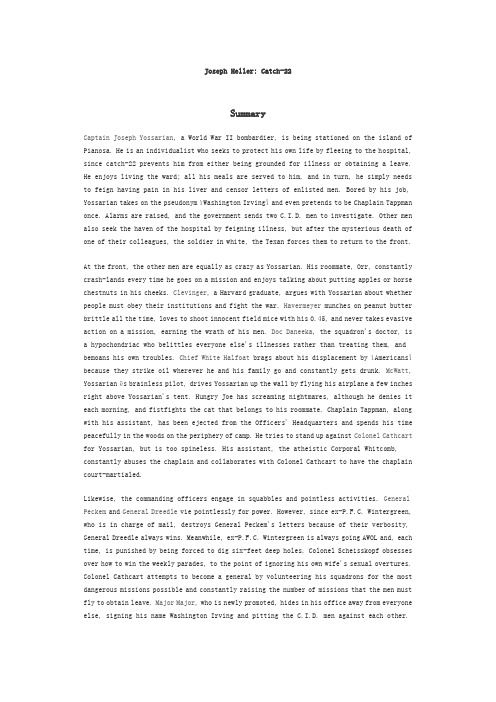
Joseph Heller: Catch-22SummaryCaptain Joseph Yossarian, a World War II bombardier, is being stationed on the island of Pianosa. He is an individualist who seeks to protect his own life by fleeing to the hospital, since catch-22 prevents him from either being grounded for illness or obtaining a leave. He enjoys living the ward; all his meals are served to him, and in turn, he simply needs to feign having pain in his liver and censor letters of enlisted men. Bored by his job, Yossarian takes on the pseudonym ìWashington Irvingî and even pretends to be Chaplain Tappman once. Alarms are raised, and the government sends two C.I.D. men to investigate. Other men also seek the haven of the hospital by feigning illness, but after the mysterious death of one of their colleagues, the soldier in white, the Texan forces them to return to the front.At the front, the other men are equally as crazy as Yossarian. His roommate, Orr, constantly crash-lands every time he goes on a mission and enjoys talking about putting apples or horse chestnuts in his cheeks. Clevinger, a Harvard graduate, argues with Yossarian about whether people must obey their institutions and fight the war. Havermeyer munches on peanut butter brittle all the time, loves to shoot innocent field mice with his 0.45, and never takes evasive action on a mission, earning the wrath of his men. Doc Daneeka, the squadron's doctor, is a hypochondriac who belittles everyone else's illnesses rather than treating them, and bemoans his own troubles. Chief White Halfoat brags about his displacement by ìAmericansî because they strike oil wherever he and his family go and constantly gets drunk. McWatt, Yossarian ës brainless pilot, drives Yossarian up the wall by flying his airplane a fe w inches right above Yossarian's tent. Hungry Joe has screaming nightmares, although he denies it each morning, and fistfights the cat that belongs to his roommate. Chaplain Tappman, along with his assistant, has been ejected from the Officers' Headquarters and spends his time peacefully in the woods on the periphery of camp. He tries to stand up against Colonel Cathcart for Yossarian, but is too spineless. His assistant, the atheistic Corporal Whitcomb, constantly abuses the chaplain and collaborates with Colonel Cathcart to have the chaplain court-martialed.Likewise, the commanding officers engage in squabbles and pointless activities. General Peckem and General Dreedle vie pointlessly for power. However, since ex-P.F.C. Wintergreen, who is in charge of mail, destroys General Peckem's letters because of their verbosity, General Dreedle always wins. Meanwhile, ex-P.F.C. Wintergreen is always going AWOL and, each time, is punished by being forced to dig six-feet deep holes. Colonel Scheisskopf obsesses over how to win the weekly parades, to the point of ignoring his own wife's sexual overtures. Colonel Cathcart attempts to become a general by volunteering his squadrons for the most dangerous missions possible and constantly raising the number of missions that the men must fly to obtain leave. Major Major, who is newly promoted, hides in his office away from everyone else, signing his name Washington Irving and pitting the C.I.D. men against each other.After the cancelled mission to Bologna, Nately, one of Yossarian's colleagues, becomes lovestruck with this whore he meets in an apartment. Aarfy and the other soldiers mock him and the whore herself rejects Nately as boring, but Nately insists that he wants to marry her. Captain Black sleeps with her each time to torment Nately. Despite this outer show of apathy, when Yossarian beats up Nately in a fury, the whore blames him and tries to beat him up. Nevertheless, shortly afterwards, Yossarian breaks the terrible news of Nately's death, and she doggedly follows him from Rome back to the camp, trying to kill him with a knife. Finally, Yossarian disposes of her by throwing her out of the back of an airplane. When he hears that her younger sister has been wrongfully driven away from Rome, he tries to find her.Perhaps the most unusual officer is Lieutenant Milo Minderbinder. He has started his own enterprise, called M&M Enterprises. He persuades everyone to join his syndicate by arguing that everyone has a share and thus profits from his work. Milo also tempts the officers with the offers of delicious food from lamb chops to fresh eggs doused in butter; in turn, he requests to . He recruits people from both sides and, since he owns the planes for both sides, also charges each side commission when he engages one enemy against the other. Milo makes a critical business error when he purchases the entire crop of Egyptian cottonóonly to discover that there is no market for it. His attempt to destroy his own crop creates widespread fury, but Milo pacifies them and instead bribes the government to purchase it off of him. At the end, Milo tries to persuade Colonel Cathcart to relieve him of the enterprise so he can fly missions like everyone else. At first, Colonel Cathcart agrees, but when he realizes how much work there is, he instead offers Milo all the planes that he wants and any medals that may result from the men being killed during the missionsThe war takes an especially harsh toll on the men and their morale. Yossarian continuously opposes the war and Colonel Cathcart's constant increase of the number of missions that are required to be able to take a leave. He argues continuously with Clevinger that everyone is trying to kill him, and that anyone who try to make him fight is just as dangerous as the enemy. Yossarian's various attempts to be grounded fail. Doc Daneeka repeatedly refuses to grant him the orders, basing his arguments on ìcatch-22.î If he is crazy, then Yossarian would be flying the missions. However, if he is not crazy and does not want to fly the missions, then he is capable of flying them and must do such. Chaplain Tappman pities Yossarian because of the latter's mentally debilitating state, and appeals to Colonel Cathcart and others to have Yossarian go home; he is too spineless, though, to be effective. Clevinger argues that the war should be fought, based on the intellectual argument that if they do not, they will lose and furthermore others will be killed in their stead because of their cowardice. Meanwhile, all the officers consider Yossarian to be crazy and merely dismiss him as a nut case.In protest against being forced to fly more than the required number of missions as designated by the Group Headquarters, Yossarian uses various strategies. At the beginning of the book, he flees to the ward and discovers what a haven it is. To prolong his stay there, he pretends to have a strange disease in which he sees everything twice. In combat, he takes evasive action during his flights to avoid being killed. He also turns back once, pretending thathis intercom is defective. When Colonel Cathcart volunteers his squadron for the dangerous Bologna mission, Yossarian moves the bombline on the map to deceive the men into thinking that it has already been captured and the air strike is called off. Despite these tactics, he cannot avoid combat entirely and is haunted by the death of his comrades. At Avignon, Snowden is killed, and Yossarian has terrible memories of his attempt to save Snowden, although . After this traumatic experience, he walks around naked, without his uniform, and watches Snowden's burial from a tree. Then, an otherwise unknown man, Mudd, is killed just two hours after his arrival and is dumped in his tent. Everyone denies the existence of Mudd, so he lies there, despite Yossarian's protests. The final straw, though, is when his dear friend, Nately, is killed at. After this, Yossarian refuses to fly any more missions.When they realize that Yossarian cannot be dissuaded, the officers try to make a deal with Yossarian that will allow him to no longer fly any missions but be ethically repulsive to him. They will send him home as long as he likes them. If he does not give in, he will be court-martialed for being involved in black market practices. Yossarian protests against such wrongful accusations, but the officers claim they are justified in jailing an innocent man to keep the war effort going. Left without any other choice, Yossarian runs away to avoid court-martialing as well as Nately's whore, who is trying to kill him to avenge Nately's death.AnalysisThe plot structure of Catch-22 is unusual in several aspects, and requires careful attention from the reader. The timeline is quite disorienting and much of it entails reminiscences of the various characters. Figures that are alluded to by other characters are often not more fully developed and explored until their appropriate chapter. Hence, much of the description and anecdotes are quite incidental, and although, they do provide a more complete picture of the character, requires the reader to sift through the material and determine what is relevant to the main plot and what is not. Despite this confusion, the reader's interest is maintained by using the plot device of foreshadowing and . Seemingly arbitrary episodes and flashbacks, such as Yossarian's traumatic recollections of Snowden's death, will become a common device for the rest of the book. The importance of the flashback of Snowden's death cannot be understated.The content of the plot touches on several crucial themes that form the groundwork for the maddening atmosphere of Pianosa. First, Yossarian constantly reiterates his right to life and using whatever means to save himself from being killed. Survival, not winning the war, is what matters to him. Also being questioned are the morals of the country. Captain Black's episode with the Glorious Loyalty Crusade points out how patriotism can be abused for someone's personal ambition or agenda. Religion is also repeatedly questioned. The chaplain himself is thrown out from the officers' headquarters and happily lives in his own world. Even he has his own doubts about God and morality, and once, when he lies, he feels so wonderful about it.The institutions that run the war and support the war, the military establishment, thegovernment, big business, and the medical institution, are also severely satirized. Perhaps the most targeted institution is the military establishment. Throughout the book, it is criticized for its bureaucracy, its inner squabbling, the absurd tactics to move up the ranks, and its absurd obsessions. Generals Peckem and Dreedle continuously squabble Colonel Cathcart constantly increases the number of missions, in an attempt to be promoted to general. The big business, represented by Milo, comes to represent a parasite that profits off of the war. This financial obsession is so bad that even Milo is willing to destroy his own squadron simply to ensure a profit. Finally, the medical institution, throughout the entire book, the doctors are presented as ignorant and presumptuous, and treat their patients without compassion, and sometimes even lack humanity. This is particularly ironic, because the traditional view of doctors is that their interest is to preserve life and to heal the sick and wounded. The representative character from this establishment is Doc Daneeka. He never listens to anyone's troubles and refuses to ground any of the men, on the grounds of the catch-22 argument.Lastly, and perhaps, most importantly, the viewpoint and logic of ìcatch-22î expose the dangers of the war. Doc Daneeka points out that the men are trapped because those who are mad will fly the missions and if they deny madness, they will be forced to fly them because they are capable of doing so. Orr turns this logic against the military bureaucracy when he begins to hope for the improbable: that he can row to Switzerland in a boat, using only an oar the size of a Dixie-cup spoon. After all, which is more likely: that he will get to Switzerland before the war ends, or that Colonel Cathcart will allow the men to take leave and return home? While ìcatch-22î is a method of rationalizing absurd ends, it lacks any common sense. Minor incidents such as the falsified theft of a plum tomato become the crucial points of evidence against the chaplain. Calamities such as the death of Nately are blown off as unimportant, because they do not serve as useful evidence in achieving the military's ends. This lack of context for the events and disproportionate viewpoint of them only underscore the horrifying lesson of the war: that rationalization (not reason) can be used for the wrong purposes when the general population does not protest against such use or lack the sense to recognize the dangers of such a technique.。
美国文学选读作家对应作品流派
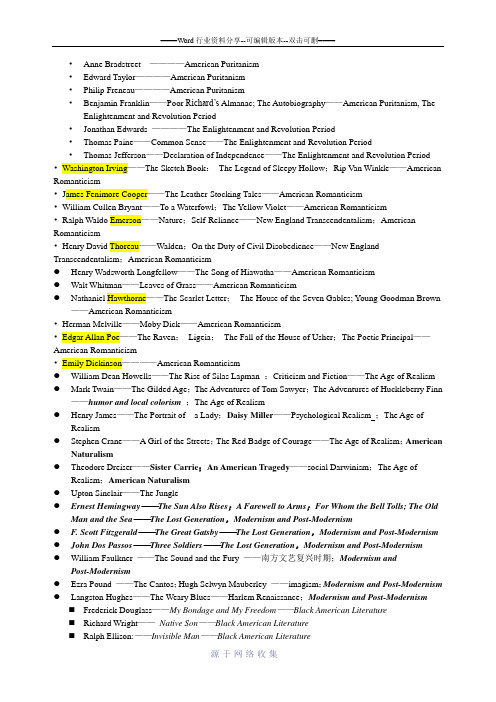
•Anne Bradstreet ————American Puritanism•Edward Taylor————American Puritanism•Philip Freneau————American Puritanism•Benjamin Franklin——Poor Richard’s Almanac; The Autobiography——American Puritanism, The Enlightenment and Revolution Period•Jonathan Edwards ————The Enlightenment and Revolution Period•Thomas Paine——Common Sense——The Enlightenment and Revolution Period•Thomas Jefferson——Declaration of Independence——The Enlightenment and Revolution Period •Washington Irving——The Sketch Book:The Legend of Sleepy Hollow;Rip Van Winkle——American Romanticism•James Fenimore Cooper——The Leather-Stocking Tales——American Romanticism•William Cullen Bryant——To a Waterfowl;The Yellow Violet——American Romanticism•Ralph Waldo Emerson——Nature;Self-Reliance——New England Transcendentalism;American Romanticism•Henry David Thoreau——Walden;On the Duty of Civil Disobedience——New England Transcendentalism;American Romanticism●Henry Wadsworth Longfellow——The Song of Hiawatha——American Romanticism●Walt Whitman——Leaves of Grass——American Romanticism●Nathaniel Hawthorne——The Scarlet Letter;The House of the Seven Gables; Young Goodman Brown——American Romanticism•Herman Melville——Moby Dick——American Romanticism•Edgar Allan Poe——The Raven;Ligeia;The Fall of the House of Usher;The Poetic Principal——American Romanticism•Emily Dickinson————American Romanticism●William Dean Howells——The Rise of Silas Lapman ;Criticism and Fiction——The Age of Realism ●Mark Twain——The Gilded Age;The Adventures of Tom Sawyer;The Adventures of Huckleberry Finn——humor and local colorism;The Age of Realism●Henry James——The Portrait of a Lady;Daisy Miller——Psychological Realism ;The Age ofRealism●Stephen Crane——A Girl of the Streets;The Red Badge of Courage——The Age of Realism;AmericanNaturalism●Theodore Dreiser——Sister Carrie;An American Tragedy——social Darwinism;The Age ofRealism;American Naturalism●Upton Sinclair——The Jungle●Ernest Hemingway——The Sun Also Rises;A Farewell to Arms;For Whom the Bell Tolls; The OldMan and the Sea——The Lost Generation,Modernism and Post-Modernism●F. Scott Fitzgerald——The Great Gatsby——The Lost Generation,Modernism and Post-Modernism ●John Dos Passos——Three Soldiers——The Lost Generation,Modernism and Post-Modernism●William Faulkner ——The Sound and the Fury ——南方文艺复兴时期;Modernism andPost-Modernism●Ezra Pound ——The Cantos;Hugh Selwyn Mauberley ——imagism;Modernism and Post-Modernism●Langston Hughes——The Weary Blues——Harlem Renaissance;Modernism and Post-Modernism⏹Frederick Douglass——My Bondage and My Freedom——Black American Literature⏹Richard Wright——Native Son——Black American Literature⏹Ralph Ellison:——Invisible Man——Black American Literature⏹James Baldwin:——Go Tell It on the Mountain——Black American Literature ⏹Alex Haley:——Roots——Black American Literature⏹Toni Morrison:——The Bluest Eye——Black American Literature●Jack Kerouac——On the Road——The Beat Generation,当代文学●Allen Ginsberg——Howl——The Beat Generation●William S. Burroughs——Naked Lunch——The Beat Generation●Joseph Heller——Catch-22——Black Humor●J.D. Salinger——Catcher in the Rye。
Catch-22

《第二十二条军规》是海勒的代表作,它是关于在第二次世界大战期间 一群人的生活。 故事发生在1944年,联盟军已经占领的罗马。第二十七美国空军的第256 中队驻扎在科西嘉和意大利之间的皮亚诺萨小岛上。只要条件允许, 轰炸队的成员就去法国南部和意大利的城市中。这是一个疯狂的世界。 指挥官命令他的助手只有在他出去的时候才让人来见他。卡斯卡特上 校一心只想向上爬,不断地提高战士的飞行次数。尽管上级说他们只 需要飞四十次就可以回家,但是一个叫做“第二十二条军规”的官僚圈 套却说他们不能回家,因为他们必须遵守长官的命令,但是长官不断 地提过必需的飞行任务的次数。更荒诞的是,在这样的疯狂世界上, 一些人却快乐的生活着。管理军官食堂的官员米洛把他的工作变成了 一个国际化的黑市食品辛迪加联合体。约塞连在他所检查的每封信上 都签上作家“华盛顿.欧文”的名字,而且,他连续几天都裸露着身体, 即使在他被授予奖牌的时候,他也没穿衣服。
苏联解体(1991) 海湾战争(1911反击伊拉克入侵科威特) 贫富差距极大 犯罪率上升 毒品问题 反托拉斯法 计算机技术快速发展 政府权力滥用:水门事件
此外,在弗拉拉、博洛尼亚和阿维尼翁飞行任务期间, 许多人在罗马的公寓房间里与妓女厮混着。 但是,死亡围绕着他们。一些人死了,因为高射炮射中 了他们的飞机,如斯诺登、马德和内特利。每当恐怖威 胁使约塞连痛不欲生的时候,他就编出某个症状,让他 住进医院。约塞连多次试图被诊断为十足的疯子,以为 这样他就能退伍。他的指挥官变得恼怒无比,最后,他 们提出,如果约塞连赞美他们,他们就把约塞连当作一 名英雄一样遣返回国。但是,约塞连拒绝了。当奥尔安 全抵达中立国瑞典的消息传到皮亚诺萨小岛,约塞连正 处在麻烦之中。他拒绝了英雄交易;大多数他的朋友都 死了;他害怕下一个飞行任务会杀死他;他还被一位试 图杀害他的妇女追逐,因为她责备他,要他为她丈夫的 死负责任。约塞连看见除了和奥尔一样选择安全和理性 别无它路,他也跑到了瑞典。
美国文学选读期末考试重点
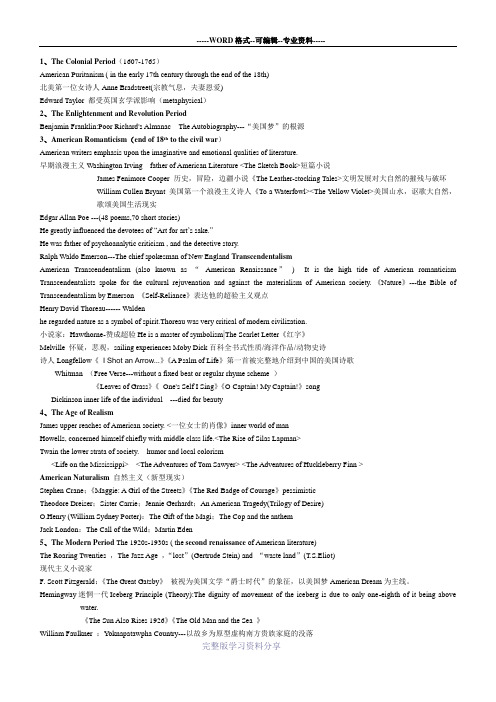
1、The Colonial Period(1607-1765)American Puritanism ( in the early 17th century through the end of the 18th)北美第一位女诗人Anne Bradstreet(宗教气息,夫妻恩爱)Edward Taylor 都受英国玄学派影响(metaphysical)2、The Enlightenment and Revolution PeriodBenjamin Franklin:Poor Richard's Almanac The Autobiography---“美国梦”的根源3、American Romanticism(end of 18th to the civil war)American writers emphasis upon the imaginative and emotional qualities of literature.早期浪漫主义Washington Irving father of American Literature <The Sketch Book>短篇小说James Fenimore Cooper 历史,冒险,边疆小说《The Leather-stocking Tales>文明发展对大自然的摧残与破坏William Cullen Bryant 美国第一个浪漫主义诗人《To a Waterfowl><The Yellow Violet>美国山水,讴歌大自然,歌颂美国生活现实Edgar Allan Poe ---(48 poems,70 short stories)He greatly influenced the devotees of “Art for art’s sake.”He was father of psychoanalytic criticism , and the detective story.Ralph Waldo Emerson---The chief spokesman of New England TranscendentalismAmerican Transcendentalism (also known as “American Renaissance”) It is the high tide of American romanticism Transcendentalists spoke for the cultural rejuvenation and against the materialism of American society. 《Nature》---the Bible of Transcendentalism by Emerson 《Self-Reliance》表达他的超验主义观点Henry David Thoreau------ Waldenhe regarded nature as a symbol of spirit.Thoreau was very critical of modern civilization.小说家:Hawthorne-赞成超验He is a master of symbolism The Scarlet Letter《红字》Melville 怀疑,悲观,sailing experiences Moby Dick百科全书式性质/海洋作品/动物史诗诗人Longfellow《I Shot an Arrow...》《A Psalm of Life》第一首被完整地介绍到中国的美国诗歌Whitman (Free Verse---without a fixed beat or regular rhyme scheme )《Leaves of Grass》《One's Self I Sing》《O Captain! My Captain!》songDickinson inner life of the individual ---died for beauty4、The Age of RealismJames upper reaches of American society. <一位女士的肖像》inner world of manHowells, concerned himself chiefly with middle class life.<The Rise of Silas Lapman>Twain the lower strata of society. humor and local colorism<Life on the Mississippi> <The Adventures of Tom Sawyer> <The Adventures of Huckleberry Finn >American Naturalism 自然主义(新型现实)Stephen Crane;《Maggie: A Girl of the Streets》《The Red Badge of Courage》pessimisticTheodore Dreiser;Sister Carrie;Jennie Gerhardt;An American Tragedy(Trilogy of Desire)O.Henry (William Sydney Porter):The Gift of the Magi;The Cop and the anthemJack London:The Call of the Wild;Martin Eden5、The Modern Period The 1920s-1930s ( the second renaissance of American literature)The Roaring Twenties ,The Jazz Age ,“lost”(Gertrude Stein) and “waste land”(T.S.Eliot)现代主义小说家F. Scott Fitzgerald:《The Great Gatsby》被视为美国文学“爵士时代”的象征,以美国梦American Dream为主线。
美国文学选读知识点整理

美国⽂学选读知识点整理1.Benjamin Franklin(1706~1790)Poor Richard’s AlmanacThe Autobiography2.Edgar Allan Poe(1809~1849)Tamerlane and Other PoemsMurders in the Rue MorguePoemsThe Purloined LetterThe Raven and other PoemsThe Gold BugTales of the Grotesque and ArabesqueThe Philosophy of CompositionTalesThe Poetic PrincipleThe Fall of the House of UsesAl AraafThe Red Masque of the Red Death LigeiaThe Black CatThe Cask of AmontilladoAnnabel LeeSonnet--To ScienceTo Helen3.Ralph Waldo Emerson(1803~1882) NatureSelf-RelianceThe American ScholarThe Divinity School AddressEssays:First SeriesEssays:Second SeriesRepresentative menEnglish TraitsThe Conduct of LifePoemsMay-Day and Other PiecesNathaniel Hawthorne(1804~1864)FanshaweTwice-told TalesMosses from an Old ManseScarlet LetterThe House of the Seven GablesThe Blithedale RomanceThe Marble Faun4.Herman Melville(1819~1891)TypeeOmooMardiRedburnWhite JacketMoby DickThe Confidence ManBattle PiecesClarelTimoleonBilly Budd5.Henry David Thoreau(1817~1862)On the Duty of Civil DisobedienceA Week on the Concord and Merrimack RiverWalden6.Henry Wadsworth Longfellow(1807~11882) V oices of the Night Ballads and Other PoemsEvangelineThe Song of HiawathaI shot an ArrowA Psalm of Life7.Walt Whitman(1819~1892)Leaves of GrassOne’s Self I SingO Captain!My Captain8.Emily Dickinson(1830~1886)To Make a PrairieSuccess Is Counted SweetestI’m Nobody!9.Mark Twain (1835~1910)The Celebrated Jumping Frog of Calaveras CountryThe Innocents AbroadThe Gilded AgeThe Adventures of Tom SawyerLife on the MississippiThe Adventures of Hucklebeerry finnA Connecticut Yankee in King Arthur’s Court The Tragedy of Pudd’nhead Wilson The Man That Corrupted Hadleyburg10.Henry James(1843~1916)A Passionate PilgrimRoderick HudsonThe Novels and Tales of Henry JamesThe AmericanDaisy MillerThe Portrait of a LadyThe BostoniansThe Princess of CasamassimaThe Spoils of PoyntonThe Turn of the ScrewThe Awkward AgeThe Wings of the DoveThe AmbassadorsThe Golden BowlThe Art of FictionThe American SceneThe Jolly Corner11.Stephen Crane(1871~1900)Maggie:A Girl of the StreetsThe Red Badge of CourageThe Open BoatThe Bride Comes to Y ellow SkyThe Blue Hotel12.Willa Cather(1873~1947)Miss Jewett13.Sherwood Anderson(176~1941) Windy McPherson’s Son Winesburg,OhioMarching MenPoor WhiteThe triumph of the Egg and Other StoriesHorses and MenMany MarriagesDark LaughterBeyond DesireDeath in the Woods and Other Stories14.Katherine Anne Porter(1890~1980) The Flowering Judas Pale Horse,Pale RiderThe Leaning TowerThe Old OrderOld MortalityA Ship of FoolsThe Jilting of Granny Weatherall15.F.Scott Fitzgerald(1896~1940)This Side of ParadiseThe Beautiful and the DamnedFlappers and PhilosophersTales of the Jazz AgeThe Great GatsbyTender is the NightThe Crack-Up16.William Faulkner(1897~1962)The Marble FaunSoldier’s PayThe Sound and the FuryMosquitoesAs I Lay DyingLight in AugustAbsalom,AbsalomThe HamletSartorisThe TownThe MansionBarn Burning17.Ernest Hemingway(1899~1961)In Our TimeThe Sun Also RisesA Farewell to ArmsFor Whom the Bell TollsThe Old Man and the SeaA Clean,Well-Lighted Place18.Ezra Pound(1885~1972)ExultationsPersonaeCathayCantosDes ImagistesIn a Station of the Metro19.Wallace Stevens(1879~1955)The Necessary AngelAnecdote of the Jar20.William Carlos Williams(1883~1963) Collected Later Poems Collected Early PoemsPatersonThe Red WheelbarrowSpring and All21.Robert Frost(1874~1963)A Boy’s WillNorth of BostonNew HamphshireCollected PoemsA Further RangeA Witness TreeFire and IceStopping by Woods on a Snowy EveningThe Road Not Taken22.Langston Hughes(1902~1967)The Weary BluesFine Clothes to the JewThe Dream Keeper and Other PoemsShakespeare in HarlemDreamsMe and the MuleBorder Line23.Archibald MacLeish(1892~1982)The Happy MarriageThe Poet of EarthConquistadorCollected PoemsJ.B.Ars Poetica24.Eugene Glastone O’Neill(1888~1953) Bound East for Cardiff In The ZoneThe Long V oyage HomeThe Moon of the CaribeesEmperor JonesThe Hairy ApeThe Great God BrownStrange InterludeDesire Under the ElmsMourning Becomes ElectraThe Iceman ComethA Touch of the PoetLong Day’s Journey Into NightThe Moon for the MisbegottenHughieMore Stately Mansions25.Eiwyn Brooks White(1899~1985)Talk of the TownIs Sex NecessaryElements of StyleStuart LittleCharlotte’s WebQuo V adimus or The Case for the Bicycle One Man’s MeatThe Points of My CompassLetters of E.B,whiteEssays of E.B,whitePoems and Sketches of E.B.White Writings from The New Y orkerOnce More to the Lake 26.Tennessee Williams(1911~1983) The Glass MenagerieA Streetcar Named DesireCat On a Hot Tin RoofSummer and SmokeThe Rose TattooCamino RealOrpheus DescendingSuddenly Last SummerThe Sweet Bird of Y outhThe Night of the Lguana27.Ralph Waldo Ellison(1914~1994) Invisible ManShadow and ActGoing to the Territory28.Robert Lowell(1917~1977)Lord Weary’s CastleLife StudiesThe DolphinSkunk Hour29.Elizabeth Bishop(1911~1979) North and SouthCollected PoemsGeography IIIIn the Waiting Room30.Theodore Roethke(1908~1963)The Waking PoemsThe Collected PoemsOn the Poet and His Craft:Selected Prose 31.Allen Ginsberg(1926~1997)HowlA Supermarket in California32.Sylvia Plath(1932~1963)The ColossusArielWinter TreesThe Bell JarLetters HomePoint Shirley33.Robert Hayden (1913~1980)Frederick Douglass34.Robert Bly(1926~)The Light Around the BodyThe SixtiesDriving Through Minnesota During the Hanoi Bombing 35.Maya Angelou(1928~)Still I Rise36.Arthur Miller(1915~2005) All My Sonse Death of a SalesmanThe CrucibleA View from the BridgeAfter the FallThe Archbishop’s CellingThe Misfits37.Saul Bellow(1915~2005) Dangling manThe VictimThe Adventures of Augie MarchHenderson the Rain KingHerzogSeize the DayMr.Sammler’s PlanetHumbolt’s GiftThe Dean’s DecemberMore Die of HeartbreakThe TheftThe ActualRavelsteinMosby’s Memories and Other StoriesThe Last AnalysisLooking for Mr.Green38.Joseph Heller(1923~1999) We Bombed in New Haven Something HappenedGood as GoldGod KnowsCatch-2239.Toni Morrison(1931~)The Bluest EyeSulaSong of SolomonTar BabyBelovedJazzParadiseLoveA MercyRecitatif40.Louise Erdrich(1954~)Love MedicineThe Beet QueenTracksThe Crown of ColumbusThe Bingo PalaceTales of Burning LoveThe Antelope WifeThe Last Report on the Miracles at Little No Horse The Master Butchers Singing Club Four SoulsThe Painted DrumThe Plague of DovesShadow TagLulu’s Boys。
第二十二条军规解析-Catch-22培训讲学

Black Humor
•Black humor is a novel school rise in 1960s in America, holds an impoetant status in the western literature. •The term black humor (from the French humour noir) was coined by the surrealist theoretician André Breton in his book Anthology of Black Humor in 1939. •Black humor refers as much to the tone of anger and bitterness as it does to the grotesque(荒诞的) and morbid(病态的) situation, which often deals with suffering,anxiety and death.Black humor is a substantial element in the anti-novel and the Theater of the Absurd.
Features of Black Humor:
ic way to express tragic situations 2.Creation of anti-hero 3.Illogical narrative structure
Black Humor are different from the traditional humor. Traditional humor bases on the optimism, which believes good will prevail over evil.Its laugh is relaxing and delightful. However,Black Humor bases on the pessimism, express tragic situations in comic way.Its laugh is bitter and forced.
Catch-22 第二十二条军规
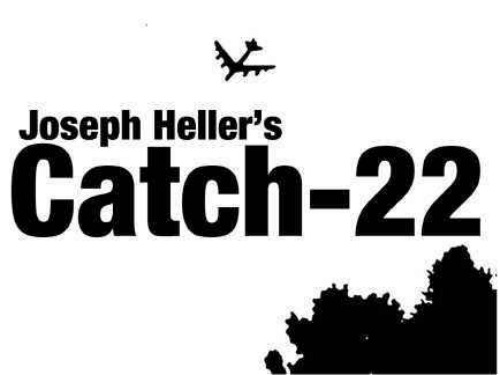
Catch-22
1. Madman may not perform flight duties must submit an application. 2. Pilots can return home after finishing 25 flights, but they have to obey orders.
Antinomy Absurd
Panic about war Criticism of the bureaucracy
In text
1. “But I’ve never had a chance to operate before. Which one is the scalpel? Is this one the scalpel?”(P312)
A synthesis of iction The fatuity and cruelty of the ruling class
“This is his pancreas, you…Shall I wash my hands first?”(P314) The absurdity and craziness of doctor Doctor’s numbness to death
2. “The raw muscles inside twitched like live hamburger meat.”(P318) Here was God’s plenty…that day for lunch.(P320) miserable and humorous Anger at war the cruelty of war
Black humor in characterization
1. Yossarian • A warrior with patriotism and sense of justice
catch-22美国文学选读
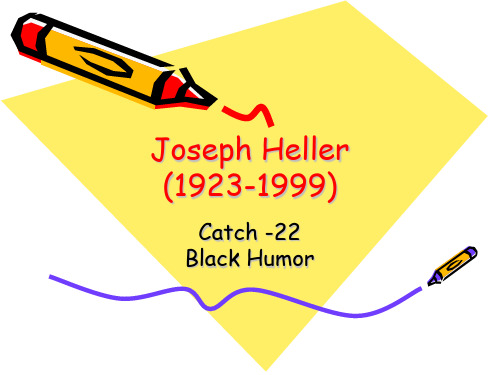
Analysis of the text
• General Setting:in an American army camp on the island of Pianosa, Rome during World War Ⅱ.
• Minor setting: yossarian remembered Snowden’s death when he (Yossarian) was wounded.
• Guilt --- Yossarian’s sense of guilty for Snowden’s death
Writing technique
• a satirical farce (A light dramatic
composition marked by broadly satirical comedy
• Ordinary characters or erated far beyond the limits of normal satire or irony.
• Black humor uses devices often associated with tragedy and is sometimes equated with tragic farce.
Main Characters
• Protagonist
• Yossarian:
• paranoid, thinks everyone is trying to kill him( which is true); thinks everyone is crazy; feels guilty about the death of Snowden, which changes his view of war.
- 1、下载文档前请自行甄别文档内容的完整性,平台不提供额外的编辑、内容补充、找答案等附加服务。
- 2、"仅部分预览"的文档,不可在线预览部分如存在完整性等问题,可反馈申请退款(可完整预览的文档不适用该条件!)。
- 3、如文档侵犯您的权益,请联系客服反馈,我们会尽快为您处理(人工客服工作时间:9:00-18:30)。
Brief summary
• The novel tells a story of a pilot soldier Yossarian in WWⅡ. His task is to accomplish a certain number of flying missions. But his superior keeps raising the number using one military rule Catch22. it mainly describes every effort the protagonist Yossarian has made for his escape from the Catch-22 and ultimately from the war.
• An example: job-hunting
Analysis of the text
• General Setting:in an American army camp on the island of Pianosa, Rome during World War Ⅱ.
• Minor setting: yossarian remembered Snowden’s death when he (Yossarian) was wounded.
Main Characters
• Protagonist
• Yossarian:
• paranoid, thinks everyone is trying to kill him( which is true); thinks everyone is crazy; feels guilty about the death of Snowden, which changes his view of war.
Minor characters
Snowden- soldier who dies in Yossarian's plane; while Yossarian was treating him for minor leg wounds, Snowden was dying of fatal chest wounds- Yossarian feels guilty because if he had known about the real problem, he thinks he could have saved Snowden's life(chapter41).
The theme
• Pity - The reader has pity for each soldier every time he is afraid to go on a mission.
• Reality- Each soldier has to face the fact that there is a chance that he may never come down from a mission alive.
• Antagonist
• Cathcart:
• colonel that desperately wanted to be a general; unsure of himself, want to impress his superiorwhich is why he keeps raising the number of the missions
Joseph Heller (1923-1999)
Catch -22 Black Humor
Definition of the term
• It used to be a military term
• Because of Joseph Heller’s Catch-22, it has
become an English idiom.
Orr- shares tent with Yossarian, practices crashing every mission- eventually crashes and escapes.
Nately – a soldier who had a love affair with a girl before his death. Yossarian broke the news of Nately’s death to her. In violent rage, she tried to kll him. Because of this, Yossarian was wounded( beginning of chapter41).
• De situation; one in which the solution or success depends on mutually dependent factors: A depends on B; B, in turn, is dependent on A; so it is an interlocking situation in which there is no way out.
Milo Minderbinder- mess officer; leader of the syndicate (black market/underground business dealings); willdo anything for a profit, even bomb his own squadron.
